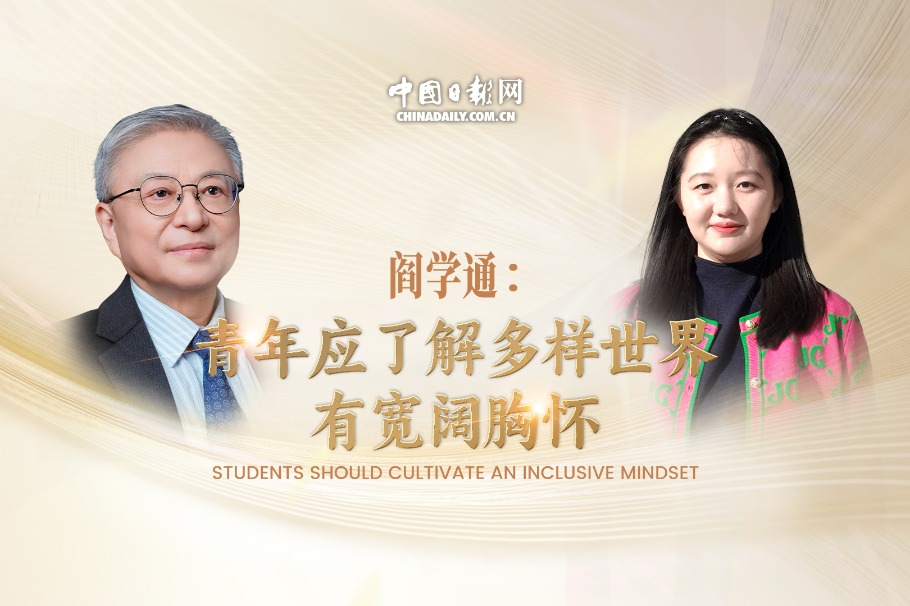I Ching: The book that helped translate itself

British translator says consulting classic tome helped him to finish the tough job
When John Minford found himself several years past deadline for publishing his translation of I Ching, the classic Chinese text also known as the Book of Changes, naturally he consulted the book itself.
"Always it just said slow down, I've waited for 2,500 years I can wait a few more'," the 69-year-old Sinologist and literary translator says. It took him 12 years to translate the Chinese classic, publishing it in October.
| Above: John Minford named his studio in Australia San Quan Tang, or Hall of Three Dogs, after his three dogs Nelson, Rusty and Maisie. Below: John Minford and his wife Rachel. Photos provided to China Daily |

"When I started the translation, I had no idea how long it was going to take. As the years went by, I realized it was a very deep book. And it is not just an ordinary book; it is a spirit. It's not like a novel, it is a book you want to use in your life," says Minford, who has translated other classic works including The Dream of Red Mansion, or The Story of the Stone, which took him 16 years.
In a chapter headed "How to Consult the I Ching", it reads: "The diviner should choose a clean and quiet place as the place of divination, with a table in the center of the room, facing south, not too close to a wall. The table should be about 5 feet long (1.5 meters) and about 3 feet wide (91 cm). Before it is set an incense burner "
Minford says it doesn't matter if these rules are followed or not, as long as the diviner stays completely sincere and truthful.
Divining involves throwing three ancient coins from the Qing Dynasty (1644-1911), and although he doesn't follow the rites exactly, the British translator says: "I'm very respectful, very sincere. It really doesn't matter which coins you use. You could use the euro. What matters is your state of mind."
I Ching uses a type of divination called cleromancy, which produces apparently random numbers. Four numbers between six and nine are turned into a hexagram, which can then be looked up in the book for an interpretation.
The first stage of Minford's translation was to read more and to explore and study the book. But understanding I Ching is difficult, he says.
"It was overwhelming at the beginning. I was sometimes at the point of giving up. But in the end the book helped me. Once I asked I Ching if the translation is a good thing to be doing. Is there a need for it? Am I the right person? It gave me some warnings not to be too proud. But it also told me to continue and try to be humble."
As he continued with his work, he says, he really tried to reach deep down into himself.
To work with I Ching, people have to put aside all pride and intellectual ways of thinking, just enter in themselves, he explains. "I believe I Ching is just a mirror, it is you yourself to understand your life and destiny."
In 2002, when he finished translating Sun Tzu's classic The Art of War, Minford says he was asked if there were any other famous Chinese books he wanted to translate. "Without thinking I just said, 'Yes, I Ching is one of my favorite books.' The next day I got an e-mail from a publisher saying, 'When can we send you a contract?'"
Minford, who since 2006 has been professor of Chinese at the Australian National University School of Culture, History and Language, was in his 20s in the 1960s, during the "days of hippy culture", when everyone was consulting I Ching, including Bob Dylan and the Beatles. There was a translation of I Ching done by a German, and all of his friends had a copy, he recalls, adding that they consulted it all the time, sometimes too much, like asking what they should eat for breakfast or where they should go for a walk.
"It was part of the hippy lifestyle. So I Ching become part of my life long before I started to study Chinese," he says. "I Ching was the first Chinese book I ever came across."
Society still needs the book, he says, explaining that, in today's world, there is a need to be calmer, more mindful, less carried away by material things. I Ching can always be a source of comfort, he says. It is such a kind and helpful way of looking at life, and to understand the interpretation requires users to be sincere and truthful.
"Once you are truthful, it goes toward the first step of knowing yourself. Get rid of fake things and know yourself. I Ching also encourages you to be cautious, not to hurry into something and take a wider view," Mindford says. "It never tells people to do something violent. It is what world leaders need."
In the past 18 months, the translator has been recovering from a stroke as well as dealing with the death of his wife. "I have to say, I Ching has been extremely helpful for me. It provides strength, which I needed very badly. I know I can always go to I Ching," he says.
Minford started to help other people to consult I Ching seven years ago. Most people's questions centered on personal relationships, career and health, he says. He also helped his four children. "They said, 'Dad could we consult I Ching about our jobs and lives?' It was wonderful to talk to my children about serious matters because normally they don't want my advice. But with I Ching they saw it as something objective, not like their father talking to them."
Each time he used his translation he says he developed it. "For the results, sometimes it's hard to understand straight away, but more and more you just need to keep thinking about it, to understand the image. It never lets me down."
Despite more information being accessible through the Internet and other modern forms of communication, Minford says the Internet can't help people to choose, it can only tell them what the choices are.
Readers of his translation are ordinary people, not necessarily intellectuals of students of literature, he says, explaining that they don't have to believe in Jesus or Buddha to use it, as the I Ching is entirely secular.
They are just interested in getting a new perspective on life, Minford says. They really want to know the answers of really important questions in their everyday life.
"I'm doing it for the average person who is willing to step back from his life and take another way of looking at it, who is willing to be open minded," he adds. "This book is Chinese, but we're all the same deep down, no matter Chinese or French or Italian."
Minford says the book is not an academic translation. To make it easier to understand, he edited out about 70 pages of footnotes and put them on his website. He often included quotations from Chinese poems that mention I Ching to make the book more readable.
"I hope my translation will help people of all ages and cultures to think more reflectively about their life. That's my goal. I want to provide something useful."
pengyining@chinadaily.com.cn
(China Daily European Weekly 08/28/2015 page28)
Today's Top News
- Spring Festival celebrations to amplify consumption
- Deeper Sino-Serbian ties eyed
- Greenland marks Europe's transition as it draws redline
- PLA Daily: China resolute in winning anti-graft war
- Davos meet lays bare tensions and challenges
- Growth gaining traction amid upbeat outlook































